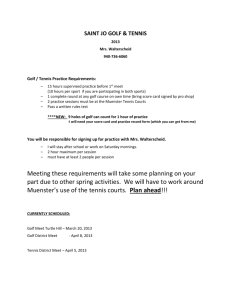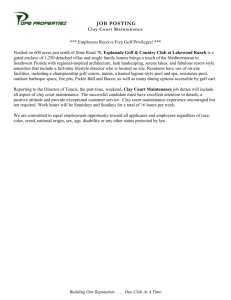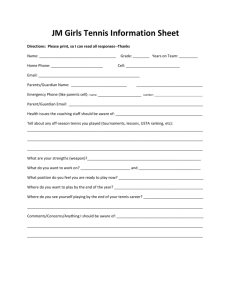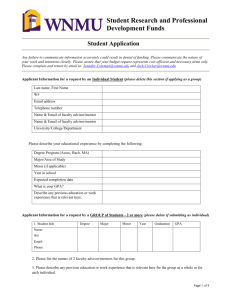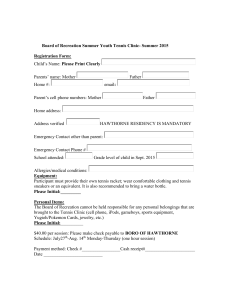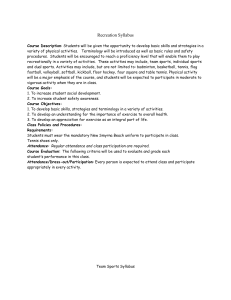Department of Wellness and Movement Sciences
advertisement
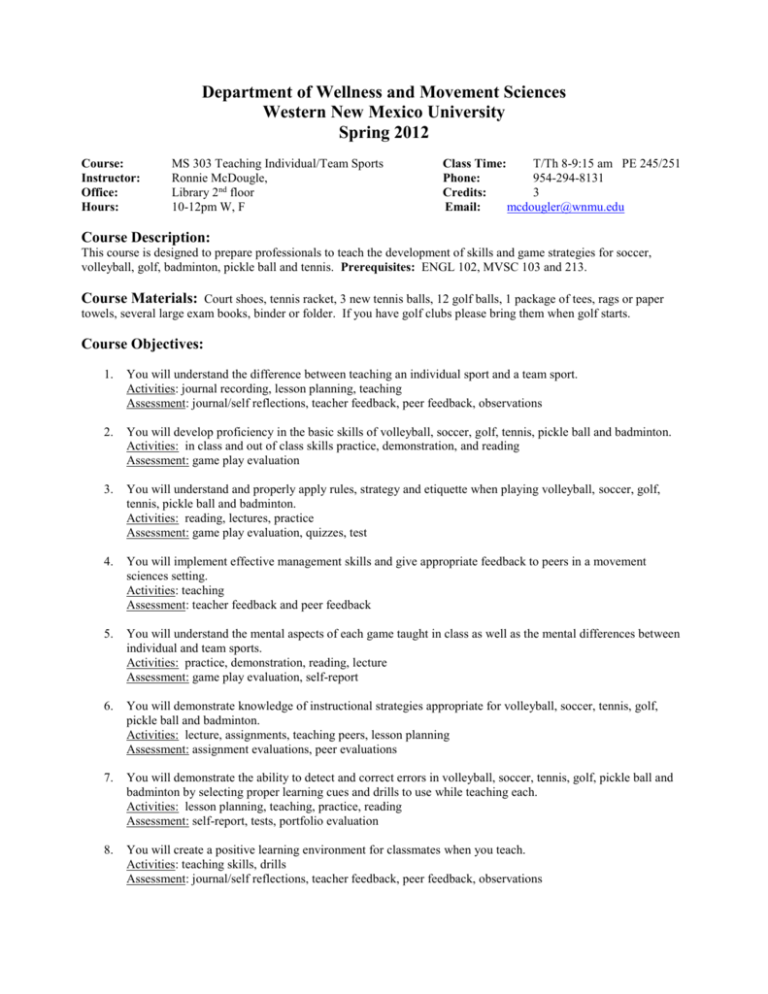
Department of Wellness and Movement Sciences Western New Mexico University Spring 2012 Course: Instructor: Office: Hours: MS 303 Teaching Individual/Team Sports Ronnie McDougle, Library 2nd floor 10-12pm W, F Class Time: T/Th 8-9:15 am PE 245/251 Phone: 954-294-8131 Credits: 3 Email: mcdougler@wnmu.edu Course Description: This course is designed to prepare professionals to teach the development of skills and game strategies for soccer, volleyball, golf, badminton, pickle ball and tennis. Prerequisites: ENGL 102, MVSC 103 and 213. Course Materials: Court shoes, tennis racket, 3 new tennis balls, 12 golf balls, 1 package of tees, rags or paper towels, several large exam books, binder or folder. If you have golf clubs please bring them when golf starts. Course Objectives: 1. You will understand the difference between teaching an individual sport and a team sport. Activities: journal recording, lesson planning, teaching Assessment: journal/self reflections, teacher feedback, peer feedback, observations 2. You will develop proficiency in the basic skills of volleyball, soccer, golf, tennis, pickle ball and badminton. Activities: in class and out of class skills practice, demonstration, and reading Assessment: game play evaluation 3. You will understand and properly apply rules, strategy and etiquette when playing volleyball, soccer, golf, tennis, pickle ball and badminton. Activities: reading, lectures, practice Assessment: game play evaluation, quizzes, test 4. You will implement effective management skills and give appropriate feedback to peers in a movement sciences setting. Activities: teaching Assessment: teacher feedback and peer feedback 5. You will understand the mental aspects of each game taught in class as well as the mental differences between individual and team sports. Activities: practice, demonstration, reading, lecture Assessment: game play evaluation, self-report 6. You will demonstrate knowledge of instructional strategies appropriate for volleyball, soccer, tennis, golf, pickle ball and badminton. Activities: lecture, assignments, teaching peers, lesson planning Assessment: assignment evaluations, peer evaluations 7. You will demonstrate the ability to detect and correct errors in volleyball, soccer, tennis, golf, pickle ball and badminton by selecting proper learning cues and drills to use while teaching each. Activities: lesson planning, teaching, practice, reading Assessment: self-report, tests, portfolio evaluation 8. You will create a positive learning environment for classmates when you teach. Activities: teaching skills, drills Assessment: journal/self reflections, teacher feedback, peer feedback, observations 9. You will think critically and reflectively concerning course content and your performance. Activities: journal recording Assessment: teacher feedback, peer feedback, evaluation of journal 10. You will participate regularly in a sportsman-like manner. Activities: practice, lecture, discussion Assessment: instructor and peer observation Evaluation: For each activity, you are to complete the assignments below: Portfolio—your portfolio for each sport is to be kept in a folder or a 3-ring binder. There will be a rubric handed out a week prior to each portfolio’s due date. Your portfolio must include: 1. Journal—for each class period, keep a narrative record of material covered and activities performed. Also, include indications of your progress. 2. Practice record—for tennis and golf, five (5) hours of practice on your own are required. Two matches of pickle ball on your own are required (see below). Include in your practice record where you practiced, when you practiced, what you practiced and with whom you practiced. Be sure to include both starting and stopping time for each practice session as well as the date. Also, include the results of the practice. 3. Observations—include in your observations who you watched, date and time. a. Tennis i. You must watch one set of tennis on TV—include all observations noted. Including scores, players and where they played. ii. You must watch one set of tennis live—players must be of advanced level. Include observations of technique, rules and strategy. Check WNMU’s tennis game and practice schedule. b. Golf i. You need to watch one hour of golf on TV—include all observations of technique, rules and strategy. ii. You may watch the Cactus Thaw at WNMU and record all observations for extra credit. 4. c. Volleyball i. You will need to watch one hour of volleyball (indoor or outdoor) on TV or live. Record all observations of technique, rules and strategy. d. Badminton i. You can play with the Wednesday afternoon group for at minimum 2 hours (if they continue to play) or you may play with classmates on your own time. Record your observations and your skill. e. Soccer i. You must watch one hour of soccer on TV—include all observations including scores, players, technique, rules and strategy. f. Pickle ball i. You need to play two matches on your own time. Record your skill level, your opponent’s skill, the strategies and techniques you used, as well as the scores. Teaching—you will be responsible for teaching at least one lesson in each of the sports we will be covering in class. Time limit and lesson content will vary per sport. Before you teach, you must submit a list of learning cues and the drills you will use for each lesson. Keep a record of each teaching session including what you taught, when, where, as well as the results of the lesson, i.e. how you think your peers did, etc. 5. Lesson plans--you must create a scope and sequence of skills you would teach to beginners. The S & S should be two (2) weeks long as well as include two (2) days of complete lesson plans. More will be discussed in class on how to create a S & S and a complete lesson plan. You will need to copy your 2 lesson plans for each of your classmates for them to put in their portfolios. 6. Self-evaluation—for each activity, include an evaluation of your level for each of the skills covered. Don’t forget the mental skills, strategies, etiquette, and rules. 7. Peer evaluations—you will have several peer evaluations on your skill and ability per sport as well as peer evaluations for your teaching. (We will use several evaluation tools. More will be discussed in class.) 8. Integration activities— Tennis—design your own drill for the skill of your choice. Include enough information so I could teach your drill. Golf—design a lesson plan you can teach to HS students that includes science. Make sure it has enough detail that a classmate can teach it. Badminton—write a limerick pertaining to badminton. Use school appropriate language Volleyball—design a drill that allows middle school students to use math. Include enough information so one of your classmates can teach it. Soccer—write a brief history of soccer that can be taught to HS students. Make up a short quiz about it. Pickle ball— design a bumper sticker pertaining to the sport. You must use school appropriate language. 9. Course play—for golf, you must one round of 18 holes. For the round, include your scorecard and a narrative discussing your course play. 10. Rules—each sport must have a page for rules and etiquette. (We will talk more about this in class so you won’t have so much work to do.) Grading Scale: 100-90% = A 89-80% = B 79-70% = C 69-60% = D 59-0% = F Class Schedule January 11 Welcome/Syllabus January 13 Teaching/Volleyball January 18, 20, 25, 27 Volleyball February 1 Volleyball Portfolio due February 1, 3, 8, 10, 15 Soccer February 17 Soccer Portfolio due February 17, 22, 24, M1 Badminton March 3 Badminton Portfolio due March 3, 15, 17, 22, 24 Pickle ball March 29 Pickle ball portfolio due M 29, M31, April 5, 7, 12 Tennis April 14 Tennis Portfolio due April 14, 19, 21, 26, 28 Golf May 3, 5 Golf Portfolio due May 10 FINAL—8am This schedule is planned to guide our activities and is not a rigid timetable. The instructor has the right to make changes if necessary and will inform the class of any such changes in a timely manner. WNMU Attendance Policy (pg. 63 of 2010-2011 Catalog) “Attendance is expected at all sessions of each course for which the student is enrolled; the responsibility for attendance is placed upon the student. The student is responsible for making up missed assignments and making appropriate arrangements with the instructor. Failure to attend class does not imply withdrawal. Instructors MAY drop/withdraw a student from the class rolls when the student accumulates unexcused absences in excess of the number of credit hours offered for the course. Students who are auditing a course will be expected to attend class regularly. The instructor has the option of withdrawing a student for not attending class. Non-attendance of classes due to late registration is considered the same as absences after registration. “An instructor may also drop/withdraw a student who does not meet the prerequisites of a course. Only students enrolled for credit or audit are permitted to attend classes. Students not enrolled may visit classes with the permission of the instructor.” Special Needs Students: Students with disabilities in need of accommodation should register with the Special Needs Office (JUANCB 210, Ext. 6498) at the beginning of the semester. With student permission, that office will notify instructors of any special equipment or services a student requires. Refer to page 45 in the 2010-2011 catalog. Communication Policy Statement regarding official email: WNMU’s policy requires that all official communication be sent via Mustang Express. As a result, all emails related to your enrollment at WNMU and class communication – including changes in assignments and grades – will be sent to your wnmu.edu email address. It is very important that you access your Mustang Express e-mail periodically to check for correspondence from the University. If you receive most of your email at a different address you can forward your messages from Mustang Express to your other address. Example: Martin Classmember was assigned a WNMU email address of classmemberm12@wnmu.edu but Martin would rather receive his emails at his home email address of martinclass@yahoo.com Martin would follow the direction provided at http://www.wnmu.edu/campusdocs/direction%20for%20forwarding%20email.htm WNMU Policy on Email Passwords: WNMU requires that passwords for access to all of the protected software, programs, and applications will be robust, including complexity in the number of characters required, the combination of characters required, and the frequency in which passwords are required to be changed. Minimum complexity shall include: Passwords shall contain at least six (6) characters. Passwords shall contain at least one capital (upper case) letter, and at least one symbol (numbers and characters such as @ # $ % & *). Passwords shall be changed at least every 90 days. (8/6/08) Academic Integrity Policy and Procedures: Each student shall observe standards of honesty and integrity in academic work completed at WNMU. Students may be penalized for violations of the Academic Integrity policy. Please refer to pages 60 and 61 of the 2010-2011 Catalog. (Clearly specify what you consider to be violations of academic honesty.) Class Procedures for Inclement Weather: If the weather is bad, please listen to the radio and/or watch a local news station on television. If you do not have access to either one, please call 800-872-9668 to find out about school closures (WNMU operator) or call my office and leave a message that you will not be in class because of the weather (575-5386236).
